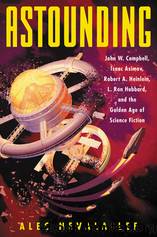Astounding_John W. Campbell, Isaac Asimov, Robert A. Heinlein, L. Ron Hubbard, and the Golden Age of Science Fiction by Alec Nevala-Lee

Author:Alec Nevala-Lee [Nevala-Lee, Alec]
Language: eng
Format: epub
Tags: History
ISBN: 9780062571960
Goodreads: 35958896
Publisher: Dey Street Books
Published: 2018-08-21T00:00:00+00:00
WHEN HUBBARD FLEW BACK TO LOS ANGELES IN AUGUST 1950, HE CARRIED THE AURA OF A RETURNING hero. No one had been more surprised by the success of his work than Hubbard himself, but he threw himself into its promotion. He had recently finished Masters of Sleep, one of his few pieces of fiction from that period, which featured a depraved psychiatrist who âhad neglected to read anything about dianetics.â At the end of the story, the villain is lobotomized.
On August 10, Hubbard held a rally before an unruly audience of six thousand at the Shrine Auditorium. He had considered presenting Sara as the worldâs first clear, but the honor fell on Sonya Bianca, a physics major from Boston, who was said to have âfull and perfect recall of every moment of her life.â When the floor was opened up for questions, however, she was unable to remember even the color of Hubbardâs tie. Afterward, Forrest Ackerman felt disappointed, but Hubbard just clapped him on the shoulder: âWell, Forry, Iâm dragging down Clark Gableâs salary.â
The Los Angeles foundation formally opened its doors several days later at the Casa, a former governorâs mansion on South Hoover and Adams Boulevard. Van Vogt rose at the crack of dawn each morning to open the office, with Hubbard showing up after an hour to meet with the instructors. When the students arrived at eight, Hubbard lectured and conducted demonstrations for audiences that numbered in the hundreds. He was a fine speaker, with a smooth delivery that rubbed some people the wrong way, as Campbell noted to Heinlein: âWhen Ron wants to, he can put on a personality that would be a confidence manâs delight.â
Hubbard enjoyed the attention, as well as its financial rewards. One day, van Vogt got a call from a bank manager who said that Hubbard wanted a cashierâs check for $56,000. Van Vogt replied, âHeâs the boss.â On another occasion, when Sara admired the cars on display at a Lincoln dealership, Hubbard bought one for her on the spot. He had achieved everything that he had ever wantedâmoney, fame, respectâbut unlike Campbell, who regarded the foundation as his true calling, he behaved as if it were a lucky break that could end at any time.
Before long, branches had opened in Washington, D.C., Chicago, Honolulu, and Kansas City. In Elizabeth, which Hubbard visited in October, the money was being spent as quickly as it came in, with its founder writing in a memo, âFunds received by the foundation have been expended to the best of the foundationâs ability.â Campbell, the treasurer, seemed unconcerned. Despite his admiration for executives, he had always left the administrative side of the magazine to Tarrant, and he came off as detached from the practical endâa visitor found him âcold and uncordial.â
Campbell was also preoccupied by what he saw as a breakthrough in his sessions with Peg, in which they were departing from orthodox techniques to concentrate on emotion and instinct. Much of the remaining workload fell on Winter, who grew concerned after two patients developed psychoses.
Download
This site does not store any files on its server. We only index and link to content provided by other sites. Please contact the content providers to delete copyright contents if any and email us, we'll remove relevant links or contents immediately.
Sita - Warrior of Mithila (Book 2 of the Ram Chandra Series) by Amish(54859)
The Crystal Crypt by Dick Philip K(36856)
Cat's cradle by Kurt Vonnegut(15334)
Always and Forever, Lara Jean by Jenny Han(14899)
Ready Player One by Cline Ernest(14639)
The Last by Hanna Jameson(10246)
Year One by Nora Roberts(9783)
Persepolis Rising by James S. A. Corey(9348)
The remains of the day by Kazuo Ishiguro(8969)
Never let me go by Kazuo Ishiguro(8877)
Red Rising by Pierce Brown(8759)
Dark Space: The Second Trilogy (Books 4-6) (Dark Space Trilogies Book 2) by Jasper T. Scott(8170)
The handmaid's tale by Margaret Atwood(7757)
The Circle by Dave Eggers(7104)
Frank Herbert's Dune Saga Collection: Books 1 - 6 by Frank Herbert(7059)
The Testaments by Margaret Atwood(6880)
Legacy by Ellery Kane(6649)
Pandemic (The Extinction Files Book 1) by A.G. Riddle(6529)
Six Wakes by Mur Lafferty(6239)
